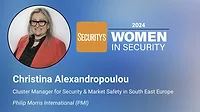Special Report: Women in Security 2023
Kristen Devitt | Women in Security 2023
Regional Director of Security, Kaiser Permanente

Background image / LightFieldStudios / iStock / Getty Images Plus / via Getty Images
Bio image courtesy of Devitt
Throughout her nearly 25-year career, Kristen Devitt has maintained the importance of helping others in their time of need, whether it be through social work, law enforcement or as an educator.
With a degree in sociology, Devitt started her career in 1999 as a Domestic Violence Victim Advocate at Countering Domestic Violence in Illinois. Throughout her career she has worked in many facets of law enforcement, including as a Patrol Officer, School Resource Officer, Lieutenant, Chief of Police and Instructor.
“After being in social services for quite some time, as someone who worked in domestic violence and child welfare, I felt very strongly about providing safe places for families, children and victims of domestic violence. So, I brought that to my job in law enforcement,” Devitt says. “I ultimately became a School Resource Officer, and that’s where my passion for threat assessment as a violence prevention method and a security tactic got ignited.”
Devitt was a School Resource Officer with the Madison Police Department in Wisconsin from 2012 until she left the department in 2015. She was also an Instructor at the National Association of School Resource Officers for seven years before being appointed in 2018 as the first Director of the Office of School Safety at the Wisconsin Department of Justice. Wisconsin is home to approximately 3,000 school buildings — including private, public and tribal — and the director role was an opportunity to think about security, safety and violence prevention on a much larger scale. While there, Devitt help set up a statewide threat reporting system, implemented a statewide threat assessment process, and disseminated more than $100,000,000 in grant funds to public, private and tribal schools.
Her role with the Office of School Safety is one of Devitt’s proudest career accomplishments. When the position was created, she said there were a lot of community members unhappy that it was a part of the DOJ instead of the Department of Public Instruction — fearing the focus would be on tactical training.
“We had such a monumental task, and it took a lot of effort to build that trust,” Devitt says. “By the time I left the organization had, and still does have, a great reputation with all of the stakeholders in the state for engaging people along the way, being inclusive of different groups that would be represented in the educational arena, providing free training, and providing services that were desperately needed.”
Something new
After a decades-long career in the world of law enforcement in the continental U.S., Devitt decided to take a chance on a different opportunity.
“I saw this position come up — Regional Director of Security at Kaiser Permanente — in Hawaii and thought, ‘It’s a very different culture, I’ve never been there before, it would be quite an experience and I could learn a lot,’” Devitt said. “I applied for the position never thinking in a million years that I was going to get it.”
But she hit it off with the Vice President of National Security Services, staying on the initial phone interview for well over an hour and discussing security perspectives and approaches.
“I think the fact that I was asking these challenging questions let them know that there were a lot of things I was interested in that would be helpful to Kaiser,” Devitt adds.
In her role as Regional Director of Security at Kaiser Permanente, Devitt is responsible for management of contract security for the Hawaiian Islands, and is the lead threat manager, workplace violence prevention coordinator and physical security manager for all Kaiser Permanente properties on the islands, which include hospitals, urgent care facilities and medical office buildings.
More than locked doors
Security at Kaiser Permanente facilities is similar to others in the healthcare industry, with access control, video cameras and security guards as well as a number of new technologies that are being tested in the field at a variety of different locations, says Devitt.
“We want to make sure the security decisions that we make are evidence-based and data-informed,” Devitt says. “As someone who is a bit more ‘boots on the ground,’ I don’t want to install something that only makes people feel safe, I want to do things that actually makes people safe. There is a difference between those two things. I can install a camera in every single corner, but if I don’t have a good workplace violence prevention program, then all I’m doing is relying on my cameras to identify who did it. The cameras don’t prevent anything. So, we think very critically and strategically about what we use and test it to make sure it has the desired outcome.”
When it comes to corporate security, threat assessment as a whole is a relatively new discipline, Devitt says, as is incorporating trauma informed practices — an understanding of how trauma affects people.
“The fact of the matter is, we’re all dealing with human beings, and we have to understand why the people that we’re dealing with are behaving the way that they are,” Devitt says. “Security isn’t just about whether or not our doors are locked. Security is really about working with the human element, and having trust so that people are willing to tell us when they have a concern and we can manage it. I think the relationships are really important, and training on how to build those relationships and how to build supportive programs is really necessary in the field.”
Framework of trust
When it comes to having a successful career in the security industry, Devitt can’t emphasis enough the importance of trust.
“I can’t do my job if the people I work with don’t trust me,” she says. “It’s really important to have a team environment and to have really good communication with people. Tell them what you’re thinking, if you have new ideas or concerns, because without that information sharing, we tend to miss things.
“The times that I have felt the most successful in my career have been because of the people I work with,” Devitt continues. “I have a great team. We communicate with each other, we’re talking in real time and we’re getting things done.”
Looking for a reprint of this article?
From high-res PDFs to custom plaques, order your copy today!







